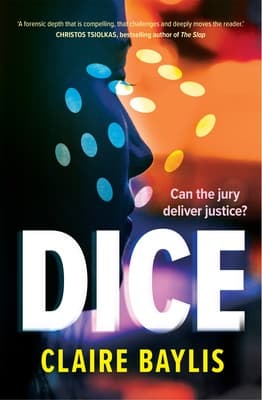Review: Dice
Reviewed by Greg Fleming
Dice, Claire Baylis’ debut novel, takes readers into the jury room for deliberations after the trial of four teenage boys accused of multiple sexual offences against three girls. Their fate, and that of the three alleged victims, lies in the hands of a jury of 12 ordinary New Zealanders.
Baylis worked as a law lecturer and academic before trying her hand as a novelist_. Dice_ has been five years in the making, written as part of a PhD in creative writing at Victoria University of Wellington Te Herenga Waka. After reading it, many readers may question whether trial by jury remains the best way to try such a case (Baylis has said in an interview that she’d opt for trial by judge).
After moving to Rotorua, where Dice is set, Baylis was an interviewer for a trans-Tasman jury study and as such is one of the few people to have interviewed real jurors about their experience. Although the case in her novel is fictional, many readers will note similarities to the Roast Busters, which involved a group of young men in Auckland who were accused of intoxicating underage girls in order to have sex with them.
The trial in Dice centres around four teenage boys who, with help from a 70s cult novel Luke Rhinehart’s The Dice Man and the British teen show Skins, concoct a sex game that’s determined by a throw of a die. If you throw a one you had to kiss the girl, two cop “a feel,” right on up to sex if you rolled a six; a game their lawyers want to pass off as a boyish prank but one that has lasting impacts on the female victims.
Baylis brings an academic’s rigour to Dice; the courtroom questioning of the complainants is relayed in detail but more interesting is how this is filtered through the various personalities on the jury and how each hears and sees the same scene differently. In doing so, Baylis examines issues of race, justice, bias and class.
We watch, along with the jurors, while each lawyer essentially re-victimises the complainants with their questions: ‘The girl kept saying no, and the lawyer kept telling the story as if she hadn’t even spoken, and her answers got quieter and quieter.’ Another witness the jury, ‘Look at him - he’s not a rapist… he is a good-looking boy. He doesn’t need to force himself on girls, by any stretch of the imagination.’
Baylis seems to be saying our justice system is broken and is particularly unsuited for sexual assault cases in the social media age especially where women are concerned. If the trial scenes can get a little claustrophobic it’s the scenes outside the courtroom, where we learn more about the jurors’ personal lives, that resonate.
Each gets their own chapter.There’s a dishwasher, a would-be Commonwealth Games swimmer, an elderly man caring for his sick wife, a woman whose experience as a juror brings up trauma from her own past. But the first chapter, perhaps the strongest of them all, focuses on a father of a teenage boy who discovers his son is having sex with his underage girlfriend. It gets the book off to an intriguing start but it’s a narrative that isn’t really developed and, in many ways, seemed part of another novel.
Owing to its heavy subject matter and the sheer number of characters involved, Dice isn’t an easy book to settle into but for those who persevere it possesses an icy power.
